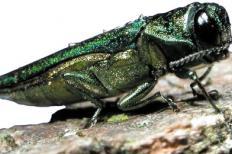






 Emerald Ash Borer (via Creative CommonsAt the end of March, the city’s Parks Division launched an Adopt-A-Park-Tree Program intended to help save trees endangered by one of Madison’s newest residents--the emerald ash borer. The small, invasive green-colored beetles were first discovered in Madison last November. Originating from Asia, the insect’s larvae feed on the inner bark of ash trees and have already killed millions of trees in other parts of Wisconsin and across the country.
Emerald Ash Borer (via Creative CommonsAt the end of March, the city’s Parks Division launched an Adopt-A-Park-Tree Program intended to help save trees endangered by one of Madison’s newest residents--the emerald ash borer. The small, invasive green-colored beetles were first discovered in Madison last November. Originating from Asia, the insect’s larvae feed on the inner bark of ash trees and have already killed millions of trees in other parts of Wisconsin and across the country.
“It is an invasive insect and 30 percent of the trees in our streetscape and the parks are ash,” said Laura Whitmore, spokesperson for the City of Madison Parks Division.
Ash trees are so common in Madison because they were used to replace elm trees affected by the Dutch elm disease in the 1960’s and 70’s.
While the city has allocated funds for the treatment and removal of trees located on city streets, the plan does not include trees located in the city’s 265 parks.
The Parks Division is encouraging residents to fill out an application, available on the Parks website. Once the adoption is approved, the resident is responsible for contacting a contractor that is licensed by the City of Madison and paying them directly. The cost for pesticide injection is calculated using the diameter of the tree at chest height, about four and a half feet off the ground. Prices can average from about $9/inch to $13/inch, depending on the number of trees receiving treatment. In order for park trees to be eligible for adoption, they need to be larger than 10 inches in diameter and meet other restrictions.
The city has been preparing for the arrival of the emerald ash borer since 2008, and assembled a taskforce. That group monitored the threat and developed strategies as the beetle continued to spread across the country and closer to Madison.
The city’s Parks website estimates 95,000 ash trees line city streets. An online database allows residents to search for affected street trees using their address. The city is committed to saving what trees it can, but recognizes that it can’t save them all.
According to Whitmore, “500 ash street trees have been removed so far, primarily on the north and east sides of Madison.”
Removed trees are being turned into mulch that will be used for landscaping purposes. Trees will be replaced with another type of tree, but not an ash.
“When we do replacements, it will depend on the unique location,” said Whitmore.
Residents are responsible for removing or replacing trees located on private property. According to Whitmore, “People need to be aware if they have ash trees in their own yards. We have toolkits for homeowners but homeowners need to be responsible.“
|
|
|
Welcome to the Madison Commons, a website designed to provide news and information about all of Madison's neighborhoods and a crossroads for the discussion of community issues. The name comes from the idea of a village commons, a place for news, talk, debate, and some entertainment, too, that's open to everyone.
All rights reserved. Read more about the Madison Commons and its partners.

